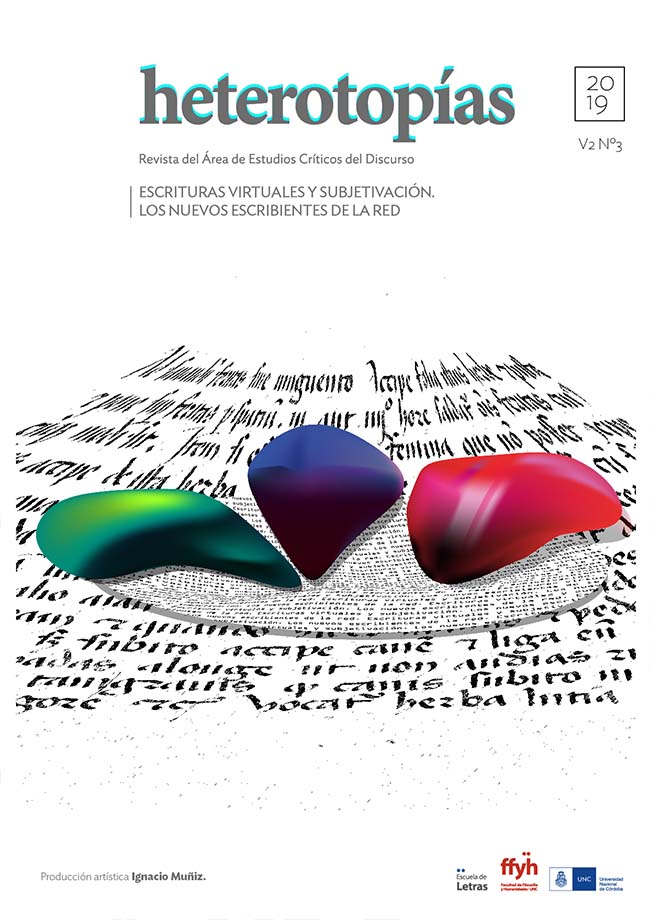Light marks, traces of the instant: registration, rewriting and legibility of digital audiovisual records
Main Article Content
Abstract
This work deals with what we still generically call digital "photography", that is, the proliferation of meticulous daily records, countless electronic traces –visual and audiovisual– that articulate new practices, rituals and routines, as archival traces of the present, problematic temporal zone, diffuse and in permanent displacement. Images-information whose flow shapes new memory economies and signifies the production of contemporary subjectivities.
When questioning the destinies of the daily audio-visual records, based on their inscriptionality in digital new media, we try to situate the problem of the archive and the memory-forgetting tensions in the context of the current sociotechnical conditions, since we consider, it is not only at stake the availability and readability of these traces, but the horizon of negotiation and dispute over the control of filing processes.
Downloads
Article Details
Those authors who have publications with this journal, accept the following terms: Those authors who have publications with this journal, accept the following terms:
a. The authors will keep their copyright and guarantee to the journal the right of first publication of their work, which will be simultaneously subject to the Creative Commons Attribution - Non-Commercial - Share Alike (by-nc-sa) Attribution License; no commercial use of the original work or any derivative works is allowed, the distribution of which must be done with a license equal to the one that regulates the original work.
b. Authors may adopt other non-exclusive license agreements for the distribution of the published version of the work (e.g., deposit it in an institutional telematic archive or publish it in a monographic volume) provided that the initial publication in this journal is indicated.
c. Authors are allowed and recommended to disseminate their work through the Internet (e.g. in institutional telematic archives or on their website) before and during the submission process, which may lead to interesting exchanges and increase the number of citations of the published work. (See The effect of open access).
How to Cite
References
Azoulay, A. (2011). Photography. The ontological question. Mafte’ akh. Lexical Review of Political Thought, 2, pp. 65-80. Recuperado de http://mafteakh.tau.ac.il/en/issue-2e-winter-2011/photography/.
Brea, J. (2003). El tercer Umbral. El estatuto de las prácticas artísticas en la era del capitalismo cultural. Murcia: Centro de Documentación y Estudios Avanzados de Arte Contemporáneo de la comunidad de Murcia.
Brea, J. (2007). Cultura_RAM. Mutaciones de la cultura en la era de su reproductibilidad electrónica. Barcelona: Gedisa.
Brea, J. (2010). Las tres eras de la imagen. Imagen materia, film, e-image. Madrid: Akal.
Darley, A. (2000). Visual digital culture. Londres: Routledge.
Deleuze, G. (2005). Lógica del sentido. Barcelona: Paidós.
Derrida, J. (1997). Mal de archivo. Una impresión freudiana. Madrid: Trota.
Derrida, J. (2008). Márgenes de la filosofía. Madrid: Cátedra.
Dubois, P. (1986). El acto fotográfico. Barcelona: Paidós.
Flusser, V. (2015). El universo de las imágenes técnicas. Elogio de la superficialidad. Buenos Aires: Caja Negra.
Fontcuberta, J. (Ed.). (2010). A través del espejo. Madrid: Oficina de Arte y ediciones.
Fontcuberta, J. (2012). La cámara de Pandora. La fotografí@ después de la fotografía. Barcelona: Gustavo Gili.
Freund, G. (2011). La fotografía como documento social. Barcelona: Gustavo Gili.
Maldonado, T. (2007). Memoria y conocimiento. Sobre los destinos del saber en la perspectiva digital. Barcelona: Gedisa.
Martínez, R. (2013). Freud y Derrida: escritura y psique. México: Siglo XXI.
Marzal, J. (2010). Cómo se lee una fotografía. Interpretaciones de la mirada. Madrid: Cátedra.
Sontag, S. (2013). Sobre la fotografía. México: Random House Mondadori.
Sorlin, P. (2004). El siglo de la imagen analógica. Los hijos de Nadar. Buenos Aires: La Marca Editora.
Žižek, S. (2014). Acontecimiento. México: Sexto piso.
Zúñiga, R. (2013). La extensión fotográfica. Ensayo sobre el triunfo de lo fotográfico. Santiago de Chile: Ediciones/metales pesados.
